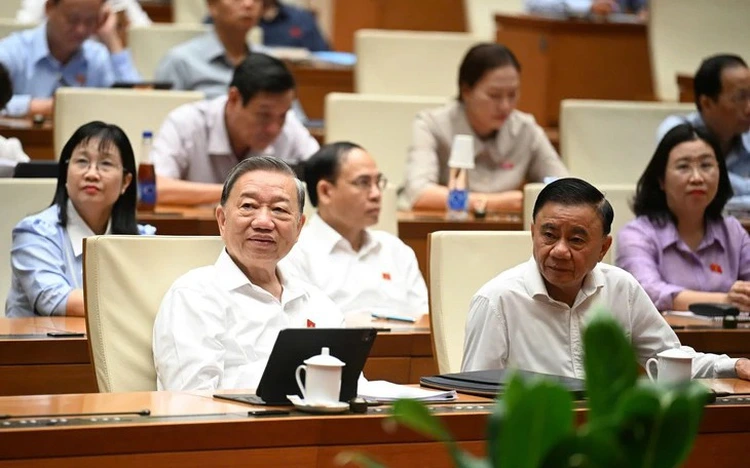
Vietnamese Party General Secretary To Lam (L, front row) and other delegates attend the National Assembly’s ninth session in Hanoi, where the legislature passed a resolution to reduce the number of provinces and cities from 63 to 34, June 12, 2025. Photo: Gia Han / Tuoi Tre
The resolution was approved at the legislature’s ongoing ninth session in Hanoi on Thursday, with 461 of the 465 deputies present voting in favor, and took effect the same day.
Under the merger plan, 52 provinces and cities have been merged into 23 new administrative units, while the remaining 11 localities will remain unchanged.
This merging results in 34 provincial-level units, including 28 provinces and six centrally governed cities (Hanoi, Hai Phong, Hue, Da Nang, Ho Chi Minh City, and Can Tho).
The 11 unaffected provinces and municipalities are Cao Bang, Dien Bien, Ha Tinh, Lai Chau, Lang Son, Nghe An, Quang Ninh, Thanh Hoa, Son La, Ha Noi, and Hue.
The resolution mandates that all competent bodies urgently prepare so that the local administrations in the newly formed provinces and cities begin operations on July 1.
For now, the existing local governments will continue until the new ones take over.
The resolution also projects a workforce reduction of around 250,000, including 130,000 civil servants and public employees, plus 120,000 commune-level part-time workers, with expected savings exceeding VND190 trillion (US$7.3 billion) in 2026–30, as reported by the Vietnam News Agency.
All provinces are expected to announce new administrative boundaries at provincial and commune levels by June 30, along with establishing leadership apparatuses for both Party and local administrations.
The resolution states that the government will be responsible for precisely defining the natural area and delineating boundary limits both on administrative maps and in the field.
Earlier on April 12, the 11th plenum of the 13th Party Central Committee passed the Politburo’s Resolution No. 60/NQTW, which approved the government's plan to streamline provincial structures from 63 to 34.
The 23 newly formed localities resulting from mergers among the former 52 provinces and municipalities are as follows.
No. | New provinces/cities | Former localities |
1 | Tuyen Quang | Ha Giang, Tuyen Quang |
2 | Lao Cai | Yen Bai, Lao Cai |
3 | Thai Nguyen | Bac Kan, Thai Nguyen |
4 | Phu Tho | Vinh Phuc, Hoa Binh, Phu Tho |
5 | Bac Ninh | Bac Giang, Bac Ninh |
6 | Hung Yen | Thai Binh, Hung Yen |
7 | Hai Phong | Hai Duong, Hai Phong |
8 | Ninh Binh | Ha Nam, Nam Dinh, Ninh Binh |
9 | Quang Tri | Quang Binh, Quang Tri |
10 | Da Nang | Quang Nam, Da Nang |
11 | Quang Ngai | Kon Tum, Quang Ngai |
12 | Gia Lai | Binh Dinh, Gia Lai |
13 | Khanh Hoa | Ninh Thuan, Khanh Hoa |
14 | Lam Dong | Dak Nong, Binh Thuan, Lam Dong |
15 | Dak Lak | Phu Yen, Dak Lak |
16 | Ho Chi Minh City | Ba Ria-Vung Tau, Binh Duong, Ho Chi Minh City |
17 | Dong Nai | Binh Phuoc, Dong Nai |
18 | Tay Ninh | Long An, Tay Ninh |
19 | Can Tho | Soc Trang, Hau Giang, Can Tho |
20 | Vinh Long | Ben Tre, Tra Vinh, Vinh Long |
21 | Dong Thap | Tien Giang, Dong Thap |
22 | Ca Mau | Bac Lieu, Ca Mau |
23 | An Giang | Kien Giang, An Giang |


Max: 1500 characters
There are no comments yet. Be the first to comment.